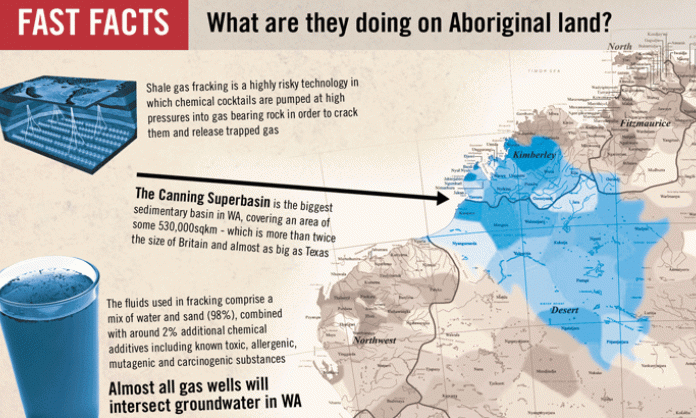Western Australian Liberal Premier Colin Barnett has given the green light to local and multinational mining companies to expand exploration and commercial production of shale gas reserves found in the Canning Basin in the Kimberley region. In doing so, he has demonstrated his government’s ongoing commitment to ride roughshod over Aboriginal rights and environmental concerns in order to stitch up money-grubbing deals for mining and construction companies.
Ranked among the top five shale gas deposits in the world, the fields of the Canning Basin are a potential super-profits bonanza for Australian and overseas mining corporations. The deposits cover a huge area – over twice the size of Victoria. According to the United States Energy Information Administration, the known deposits in the Canning Basin are more than double Australia’s offshore reserves and represent the most promising location for unconventional gas extraction outside the United States.
The gas will be extracted by hydraulic fracturing (“fracking”), which involves pumping sand, water and chemicals into underground rock formations to create fractures through which the gas can be released. The process risks ground water contamination and other environmental impacts. It was banned in France two years ago.
The expansion of mining operations in Western Australia will dramatically increase the number of fracking wells and pipeline and road construction stretching over tens of thousands of square kilometres of Aboriginal land. The area includes the second largest artesian basin in Australia. In many places aquifers are adjacent to the strata where fracking operations will take place.
Community opposition
Lack of consultation with traditional owners and concerns over the spread of fracking wells has sparked community opposition. Jabir Jabir woman Lorna Kelly told Red Flag that people are not aware of the extent of current exploration, let alone future plans. “There wasn’t proper info on the ground for the public, so while we were trying to protect James Price Point, they were actually working on other deals which were taking place, which actually started in 2010.”
Kelly is deeply concerned about the impact of mining. “The fracking is a major concern within our community and has a major impact on our environment – it can lead to deformity and impacts all living things. One of the major issues is that we Aboriginal people still hunt and live off the land.”
Legal challenges are being prepared by clan and family groups from the Yawuru, Nyikina Mangala and Karajarri. Wayne Bergmann, a spokesperson for KRED Enterprises, which is representing traditional owners, told reporters on 19 June: “We are concerned that the agreement creates a new form of tenure for the companies and has major effects on the procedural rights afforded to the traditional owners under the Native Title Act … The act is flimsy enough as it is without the state government trying to circumvent it to support the interests of big multinational companies over Aboriginal people.”
The Barnett government has also passed legislation securing land at James Price Point for a future gas processing facility, which has been at the centre of a campaign by a coalition of Aboriginal and environmental activists who have fought to protect sacred sites and unique coastal areas. The mining companies and the government have sought to divide and manipulate the community.
Kelly points to some of the current mining practices and impacts around the Fitzroy Crossing area of the Kimberley: “With regards to water, with regards to employment and our people working in different places, the town [Fitzroy Crossing] is showing an ugly side. There is a lot of red neck stuff going on that our people have to put up with if they try to do some training to get into work which is rubbish.”
‘Third World situation’
“You have got those who are trying to protect the environment and those who are trying to stay alive and stay afloat with their family”, Kelly told Red Flag. “There needs to be consciousness and awareness raised in regards to the Canning Basin and the shale gas and fracking going on. We don’t want that in our community. We don’t want that in our region. A lot of our people still live in a Third World situation, you know. Australia is a very rich country and Western Australia holds considerable wealth, so how come we are still living a Third World lifestyle today? It doesn’t measure up.”
“We still have to prove today, through the process of native title, who we are – when we know where we come from and who we are and how we are attached to country”, she said.
Whatever crumb-like benefits may be offered from the expansion of projects in the Kimberley, it will do little to overcome decades of abject poverty and exploitation. The poor track record of the Barnett government on Indigenous rights, along with the policies of previous Labor state governments, has led to serious social breakdown and trauma for Aboriginal people across WA.
Youth suicide rates are among the highest in the world. Aboriginal leaders have described the situation as “an absolute epidemic”. At the same time, the rate of incarceration of Indigenous youth is steadily rising, adding to the dislocation of a generation. Aboriginal youth in WA are 43 times more likely to be detained than non-Aboriginal youth.
Kelly told Red Flag that the fight against the mining companies and the government is “a matter of protecting our humanity. It’s our human rights – our right to live on this planet, our right to look after what we have without being run over by mining companies and the government. The government needs to see who we really are. We make this country, we are not just herds of cattle. We are human.”








